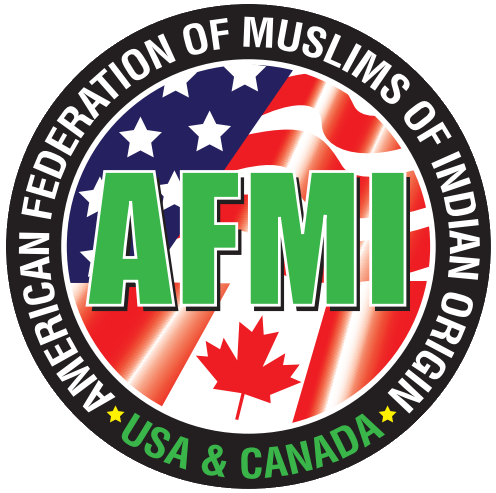The American Federation of Muslims of Indian origin (AFMI) held its 27th annual convention in Chicago, IL on October 7.
AFMI was formed in 1989 by Muslims of Indian origin to work for the educational uplifting of Muslims in India. In the last 28 years of its existence, it has opened up hundreds of schools, colleges and clinics while participating in rehabilitation and relief programs all over the country.

The flagship of AFMI’s work is its national and regional gold, silver and bronze programs offered to high achievers in secondary and higher secondary students in all 29 states and over 600 students. During the last 26 years, AFMI has given awards to over 3,000 students. When the organization began its medal program the average marks received by students in high school or higher secondary were about 76 percent. Last year, even the students with 98 percent marks were competing for bronze medals. The medal program has generated a spirit of competition and progress among Muslim students and has helped inspire thousands of students to work harder to secure a better educational future for themselves.
AFMI has promoted the emergence of a new educational identity among Muslims in India and convinced the younger Muslim generation that education is the essence of progress and prosperity. AFMI holds two annual conventions in the US and India. These conventions are organized with the help of local communities. AFMI’s convention in India will be held in Jodhpur on December 30 and 31, in cooperation with Maulana Azad University.
This year AFMI has also decided to expand its medal program by opening it to students coming from religious communities other than Muslims as well. Each year AFMI plans to offer gold medals to non-Muslim students from all 29 states in addition to Muslim students.
Dr. Ram Puniyani, a worldwide known human rights activist was the Honored Guest from India and a keynote speaker at the convention. He asserted that the communalization of Indian politics by certain special interest groups, motivated by their narrowly defined religious agenda, was one of the factors causing insecurity among minorities and Dalits.
He appealed to the delegates and participants to strengthen secular forces to ensure that India retains its multi-cultural and multi-ethnic identity.
Dr. Tajuddin started the convention and introduced AFMI’s efforts in uplifting the lives of underprivileged and poor Indian students and their families. He also highlighted other AFMI projects.
Dr. Abidullah Ghazi talked about the important and vital role of Muslims in freedom struggle of India. He also emphasized on the importance of secularism, democracy, pluralism in Indian constitution.
Dr. Aslam Abdullah, the Master of Ceremonies, (MC) made remarks about the guarantees and protection of freedom of speech, religion and secular character of Indian Constitution.
Kannan Srinivasan discussed the human rights violation and injustices towards Muslims and other minorities in India.
Dr. Khutb Uddin spoke about the psychological impact due to the rise of extremism and fanaticism in the Indian politics and how it has been affecting negatively on the Muslims and other minorities. It has created fears, phobias, and an insecure atmosphere.
Rajeev Ravi Shankar gave a thought-provoking presentation on how RSS and BJP are planning to make India a Hindu state. He further added how RSS is having international connections and using new technologies like, social media and web media to poison youth.
Dr. Akbar emphasized on the interfaith dialogue and conflict resolutions to deal with the challenges of right-wing extremists.
Professor Balwant Singh Hansra focused on Sikhs’ sacrifices and their contribution in India’s independence. He stated that even after 70 years of independence, Sikhs’ pains, sufferings, and grievances have not been addressed. He stressed on the need of unity among secular Hindus, Muslims, Sikhs, Dalits and other minorities.
Dr. Nagamia talked about how difficult it is for Muslims in India to get any support or even protection of their basic human rights from the government.
Dr. Nakadar expressed his deep concerns about the polarization of communities. He said out of 1.3 Billion the total population of India, 4635 (that is 78%) consist of linguistic, social and cultural categories. Religious groups form only 19.4%. Based on this diversity, he exhorted, that if India wants to achieve meaningful progress, growth and development, it must develop a cohesive society and not a coercive society- an accommodative society and not an annihilating society. Unity doesn’t mean uniformity.

AFMI delegates and speakers with Prof. Ram Puniyani (6th from left) a night before the convention.
Honorable Illinois Secretary of State Jesse White welcomed the delegates and attendees. He thanked AFMI for its efforts to uplift and educate the poor and underprivileged Indian Muslims. He talked about the importance of harmony in the US among all citizens, be it US, Indian or any other country.
After the speeches, Honorable Consular General of India and Chicago, Neeta Bhushan, the Chief Guest of the convention, addressed the convention and congratulated AFMI for its efforts and improving the educational and economic status of Indian Muslims. She reassured that India’s commitment to secularism and pluralism is deep and the rights of all Indians are protected by the constitution.
She gave the award of Pride of India to Keynote Speaker Dr. Ram Punyani, Excellence Awards to Dr. Abidullah Ghazi for his commitment to excellence in educational services, to Sher Rajput for building the harmony among all communities of India, and Azhar Azeez for his leadership and dedication to the plural American society. She also distributed Distinguished and Appreciation awards.

Towards the end, Azhar Azeez, President of Islamic Society of America, gave a passionate lecture about the situation of Muslims in India and appealed for fundraising for AFMI’s educational programs.
After the fundraising a lavish dinner was served followed by a musical program by the world renowned gazal singer Munni Begum Saahiba. The event ended around 1 AM, with a feeling of joy and excitement.

